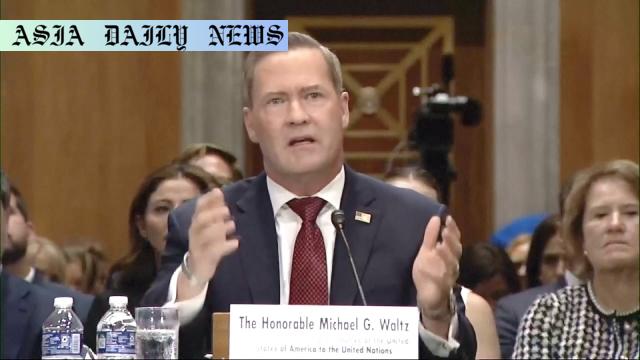UN Ambassador: Mike Waltz vows to cut costs and counter China.
Mike Waltz, UN ambassador nominee, aims to oppose China’s growing influence.
He criticized inefficiency in the organization and seeks reforms.
Trump administration faces pushback over budget cuts impacting UN programs.
Senator Shaheen highlights the risks of China’s increased UN involvement.

Introduction: A Nominee’s Bold Vision
Mike Waltz, the latest nominee for the United States ambassador to the United Nations under President Donald Trump, has recently made waves with his ambitious agenda. Tasked with one of the most globally scrutinized roles, Waltz aims to bring about dramatic reforms in the UN. His confirmation hearing reflected his intent to tackle inefficiency, curb overlapping agency functions, and oppose China’s heightened influence at the organization. These goals not only reflect his priorities but also underscore the current administration’s broader ideological stance on international governance and expenditure.
Challenging Efficiency and Cost Structures
During his Senate confirmation hearing, Waltz criticized the United Nations for what he identified as inefficiencies and redundancies. Specifically, he mentioned that the organization’s more than 80 agencies have overlapping missions, leading to unnecessary resource expenditure. Waltz expressed his commitment to streamlining UN operations and ensuring taxpayer dollars are used effectively. In his own words, the nominee stated that he was determined to “make the UN great again,” aligning his rhetoric with President Trump’s vision of international reform. These criticisms align with a long-standing conservative critique of the UN as a body susceptible to bureaucratic waste and inefficiency.
Addressing the Elephant in the Room: China
One of Waltz’s central points revolved around China’s growing influence within the United Nations. As the second-largest financial contributor after the United States, China has leveraged its monetary contributions to expand its political sway. Waltz firmly committed to opposing what he termed as “Chinese Communist Party influence.” According to him, countering China’s strategic maneuvering within the UN is of paramount importance if the US aims to maintain its global leadership. At the hearing, Waltz underscored initiatives to diminish China’s expanding reach across the UN’s economic, social, and political agendas.
A Clash of Ideologies: Balancing Budget Cuts and Geopolitical Realities
The hearing also highlighted a key dilemma of the Trump administration: achieving cost reductions while maintaining or fortifying US influence at the United Nations. Critics such as Senator Jeanne Shaheen argue that aggressive budget cuts create a vacuum that China is quick to fill, thus hampering efforts to counter its influence. Shaheen’s comments draw attention to the interconnected nature of cost reduction policies and geopolitical strategy. She pointed out that without a consistent international policy, countering China’s agenda remains a significant challenge. This underscores the importance of strategic spending and long-term planning in maintaining the US’s dominance within global institutions.
Public Perception and Transparency Issues
Another significant issue that has followed Waltz into his nomination is his use of a private messaging app, which led to the leak of classified military information. Though this controversy predates his recent appointment, it has been a focal point of criticism. Many argue that the incident calls into question Waltz’s commitment to transparency and accountability. However, his supporters contend that his steadfast focus on reforms and combating adversaries like China outweighs past missteps, providing the necessary fortitude and strategic mindset for the role of ambassador.
The Path Forward
If confirmed, Mike Waltz will face a multifaceted challenge that includes eliminating inefficiencies in the UN, countering China’s influence, and addressing the concerns raised by his critics. Achieving cost reductions without compromising US leadership requires a nuanced approach, and Waltz’s performance in the role will likely have far-reaching implications for international relations. Most importantly, his tenure will be tested against his promise to revitalize and reform one of the world’s most significant global entities into a streamlined and efficient force.



Commentary
Introduction to Leadership Challenges
The nomination of Mike Waltz as the US ambassador to the United Nations comes at a critical juncture for both global diplomacy and domestic policy. As the global stage faces mounting complexities ranging from geopolitical tensions to resource distribution challenges, Waltz’s platform offers both opportunities and questions. His commitment to reform and combating China’s influence is welcome, but how effectively can he deliver on his promises amidst the challenges posed by budgetary pressures and institutional inertia?
Balancing Cost Cuts with Global Influence
One of Waltz’s key proposals to reduce inefficiencies and streamline operations within the UN may appeal to fiscal conservatives, but it necessitates careful navigation. The interconnected nature of cost reductions and global influence cannot be overstated. A strong US stance within organizations like the UN depends as much on monetary contributions as it does on diplomatic initiatives. Ensuring that domestic budget cuts do not inadvertently weaken international leadership will test not only Waltz’s commitment to reform but also his strategic foresight.
The China Factor
China’s growing presence within the UN represents both a challenge and a call to action for US leadership. Waltz’s prioritization of this issue reflects a strategic understanding of the dynamics at play, but it is no small task. China’s influence has been built over years of targeted efforts, financial investments, and strategic diplomacy. Dismantling or countering this influence will require a cohesive and consistent US foreign policy, something that critics argue has been lacking in recent years. Waltz’s ability to envision and execute such a policy will be central to his success.
Looking Ahead
Ultimately, Mike Waltz has presented both an ambitious vision and faced significant scrutiny. The stakes of his potential confirmation extend beyond the UN itself; his performance will influence broader perceptions of US global leadership. As he seeks to “make the UN great again,” observers will closely monitor how effectively his lofty goals translate into actionable results. If managed well, this moment represents an opportunity to reassert American values and leadership on the world stage, but it will require discipline, diplomacy, and strategic thinking to truly succeed.